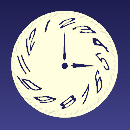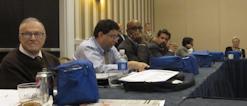

The main focus of NSART is public health: spreading awareness of the need for sleep, and the consequences of not getting enough sleep. The goal is to reduce the public health and safety impact of sleep deprivation and sleep disorders. All the various disorders groups have a common interest in this.
One example they cite is that ten years ago articles on health in the popular press were about nutrition and exercise. Now, and partly through their efforts, the articles are about nutrition, exercise, and sleep.
 Since this was the last meeting under the current five-year funding contract, it was devoted mostly to reports on what's been done. It is hoped that a new funding contract will be forthcoming.
Since this was the last meeting under the current five-year funding contract, it was devoted mostly to reports on what's been done. It is hoped that a new funding contract will be forthcoming.
I arrived at the meeting at 1:00, and was welcomed by the group. Since they had introduced their organizations in the morning, they invited me to introduce CSD-N straight away. I did so, as follows:
Hi. Thank you for putting up with my sleep schedule, and letting me speak later.
I'm Peter Mansbach, and I'm President of Circadian Sleep Disorders Network.
We are dedicated to promoting awareness and accommodation for circadian sleep disorders, in particular Delayed Sleep Phase Disorder and Non-24-Hour Sleep-Wake Disorder.
Research surveys estimate 0.15% of adults suffer from Delayed Sleep Phase Disorder. That's about half a million Americans (over 1 in 1000). That doesn't count the many adolescents for whom the disorder wanes in early adulthood. In addition, it has been estimated that 75,000 Americans suffer from Non-24-Hour Sleep-Wake Disorder. These are mostly blind folks, but it does include a number of sighted individuals as well - I've counted over 50 on our small email list and Facebook page.
I have heard so many stories from our members, of doctors who don't believe in these disorders, and even sleep specialists who insist that, if only the patient did what was prescribed, he would be able to live on a normal schedule. Some people are helped by treatment, including light and melatonin, but some are not. I feel our most urgent task is to spread awareness, among the public and especially within the medical community, of these disorders, of how disruptive they can be to people's lives, and how threatening to their health, and that they cannot always be brought under control.
Far too many people are being treated for depression or ADHD, when the real problem is sleep deprivation due to a circadian disorder. And they are often prescribed medications based on these diagnoses, that may have their own side effects, but that don't work since they aren't addressing the underlying circadian disorder.
I keep reading emails from members who are trying to hold down a daytime job and only getting 3 or 4 hours of sleep a night. These people are destroying their health. Some have already been diagnosed with diabetes or other serious, long-term health problems.
Worse yet, they do not get support from their physicians. They are told they are lazy, they are told they are not following the prescribed regimen strictly enough, they are told they could hold a daytime job if only they pushed themselves harder. But they are pushing themselves. And they are destroying their health.
I read emails from people who have found a career that allows working at night, only to learn that the training they need to get certified can only happen in the morning. In other cases employers, while desperate for people willing to work at night, nevertheless require everyone to work day shifts part of the time.
These things need to change, and we need to raise public awareness about sleep and circadian disorders to achieve that.
We have a website with tons of information that you can reach at CSD-hyphen-N.org (and you do need the hyphen, or you get the Chinese Software Develpment Network).
Thank you.